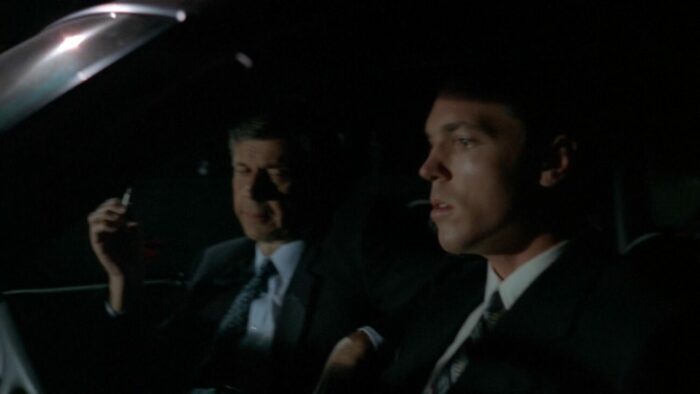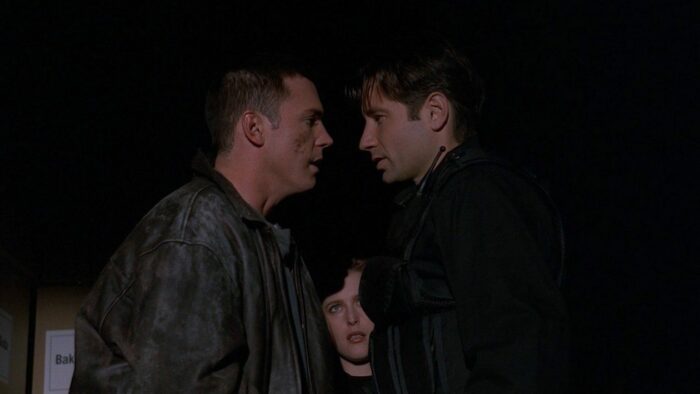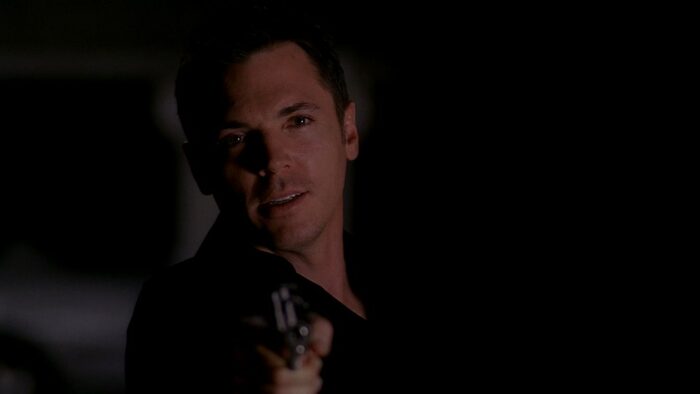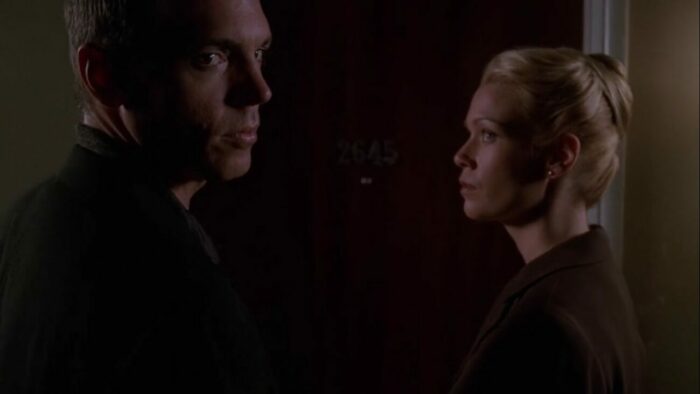Last year I wrote what I believed would be my one and only Krycek essay, into which I poured nearly everything I could possibly deduce about his character. If you haven’t read it (I won’t take it personally, although I assure you it’s good stuff!), I will reiterate the most basic summary of his character: “Krycek is mostly defined by three major on-screen relationships—the Smoking Man, Assistant Director Skinner, and Agent Mulder—with a handful of others along the way, and his motives could be broadly defined as survival, power, and revenge”.
Lo and behold, a year older and wiser, I am back to take a different approach. I noted that up to a year between his appearances means casual viewers may forget significant details about his motives—not to mention that the nature of mythology episodes is to have multiple concurrent plot lines so as to take advantage of the great ensemble cast (e.g. in ‘Two Fathers’/’One Son’ and ‘DeadAlive’). The show does not invest as much care in Krycek’s story as it does in the protagonists’. Therefore I am going to propose a thought experiment: imagine a world in which Krycek is the protagonist. How might this change the concept and stakes of The X-Files?
And while it is a thought experiment, just another excuse to play in the playground The X-Files, I have two goals in mind. Firstly to re-contextualise some of what I wrote last year. The idea of it being The Alex Krycek Show is that there is an Alex Krycek Big Picture that is not made explicit to us in The X-Files. For example, last year I focused heavily on revenge as his primary motive, and this creates a problem—namely, what is he doing after ‘Requiem’? Secondly—and the two are related—to examine the power of context itself. If we flip the narrative perspective then “Krycek attacks Skinner in a stairwell” can become “Krycek retrieves the digital tape from the possession of the FBI” and while both are true, words like “attacks” and “retrieves” (rather than, say, “steals”) paint different pictures. Even reducing Skinner to the faceless authority of “the FBI” has certain implications.
I aim to carry out this experiment by assuming my usual anti-intentionalist stance, and without resorting to head-canons to make Krycek more palatable. You will see how the latter becomes a challenge, what with the many gaps in his X-Files story, but it’s all part of the experiment!
Lastly before I begin, Krycek may not be the villain that some people make him out to be, but he is villainous. Now, I am neither capable nor willing to determine the precise relationship between fiction and real-world morality, but I am writing this essay in view of: a) my own sympathetic bias towards Krycek; and b) our collective willingness to brush over the misdeeds of certain FBI Agents and ADs just because they are the protagonists.
The Pilot
Let me pitch you the main character of The Alex Krycek Show:
Alex Krycek is a man leading a double life. His mission is to spy on an FBI agent and report back to the sinister Smoking Man. He wants to succeed at his mission, possibly he wants to impress The Smoking Man (“Sir, if I can recommend something. You’ll see that I have outlined several countermeasures”); he is ambitious, and people-pleasing. He’s a good liar, and a good shot. But he’s also a believer in the paranormal—he’s curious, bordering on paranoid, and growing more suspicious of his employer every day. His distrust of authority is established early on (“there was more out there than they were telling us”). When he learns that he is nothing but an expendable grunt, his mission becomes one of revenge.
From the start, Krycek is being pulled in two directions. On the one hand, he is loyal to his mission, going to extreme lengths to see it through. On the other hand, as he gets to know Mulder he sees that he’s not such a bad guy—he could even be a mentor (dare I say friend?) as he indulges Krycek’s curiosity in the paranormal. Furthermore, in ‘Ascension’, he suspects his employer is responsible for the abduction of an innocent woman (his line: “I’ll hold him off until they locate her” implies that he believes Scully is going to be found). Krycek is an avatar of the Syndicate’s evil whim (“you have no rights, only orders to be carried out”). As he begins to see The Smoking Man for who he really is, the audience begins to hope that Krycek might be the one to take him down.

We can only speculate about how The Smoking Man recruited Krycek in the first place, and how much he was told about The Project (his heart-to-heart with Jeff Spender in ‘Two Fathers’—”you’ve never seen one before, have you?”—makes me wonder when the first time Krycek saw an alien was. I sort of doubt he had that kind of privilege in his early days in the Syndicate). Perhaps there was blackmail involved, perhaps The Smoking Man was preying on patriotism and ambition. In the Anasazi trilogy, The X-Files makes it look like Krycek is just a thug who likes to beat people up, which is frustratingly much less interesting than the inner conflict that seems to arise in ‘Ascension’, and doesn’t help us when trying to fathom why he agreed to spy on Mulder. In the absence of this knowledge, why are we rooting for him?
Well. Okay. Alex Krycek’s story starts the day he meets Fox Mulder. Mulder is possibly the most important character to Krycek’s arc. And the way that Mulder is portrayed is perhaps the biggest difference between The X-Files and The Alex Krycek Show. When he is introduced to The Alex Krycek show in ‘Sleepless’, Mulder is rude, selfish, and paranoid. It is practically his first action on screen to ditch Krycek “like someone’s bad date”—our first impression of him is not particularly sympathetic. The Alex Krycek Show neither knows nor cares about his tragic backstory. According to The Syndicate, he is a threat to The Project, a national security risk, and it is Krycek’s job to keep him in line. Moreover, Mulder and Scully act quite conspiratorial, leaving Krycek out of their conversations—maybe we ought to be suspicious of them. How does it look, for example, when Mulder sneaks away to meet his informant without telling Krycek where he is going? “There’s things you’re not telling me that I need to know,” says Krycek, and the audience would understand his frustration.
“If Mulder is such a threat, why not eliminate him?”
“That’s not policy.”
“It’s not? After what you had me do?”
“Kill Mulder and you risk turning one man’s religion into a crusade.”
—Krycek and The Smoking Man, ‘Ascension’
The Idea
What does Mulder—our lovable, intelligent, socially awkward hero—look like as a villain? Well…heroism is a house of cards that might be knocked down by all the breath it takes to say “copaganda”. In The Krycek Show, Mulder, Scully, and Skinner have privilege and bureaucratic power; Krycek does not. But more than this, Mulder makes the perfect antagonist for Krycek because of what he symbolises…or the mere fact that he is a symbol. Mulder is The Idea. “The truth is out there” and “I want to believe”. He is quite the opposite of Alex “There Is No Truth” Krycek. The big questions of The Alex Krycek Show are about survival vs sacrifice, and pragmatism vs idealism—on one side you have Krycek and on the other, Mulder.
“Make them a deal, Mulder. Guilty on a lesser charge. Maybe they’ll go for it and they’ll let you walk out of here.”
“I’d rather die, Scully.”
—Scully and Mulder, ‘The Truth’

“It’s shocking at first. The acceptance of the idea, it’s… It’s something you thought only children and fools believed in. It undermines your beliefs—in yourself, in the world”
—Krycek, ‘Two Fathers’
Last year I wrote about categorical and hypothetical imperatives. The upshot is that categorical (unconditional) imperatives like “do not kill” are not very pragmatic. Mulder, Scully, and Skinner all betray this imperative when they kill in self-defence, for example. The real truth is that categorical imperatives do not exist at all. There is always an implied “if” or “unless”. Do not kill unless survival is more important than moral purity. It is pretty much the guiding principle of Krycek’s life that his own survival is more important than morality, and this is why he is vilified in The X-Files. However, what Krycek proves with the nanobots is that Skinner would do the exact same thing in his position. Therefore in the conflict between pragmatism and idealism, the function of Skinner and the nanobots plot line is to show that pragmatism wins.
I will come to talk about his death soon, but to show a contrast (perhaps… character development) to the nanobots plot line, look to his final scene as a ghost in ‘The Truth’. He looks on, satisfied, as Mulder gives his speech about…well, the truth: “if I am a guilty man, my crime is in daring to believe that the truth will out and that no one lie can live forever. I believe it still. Much as you try to bury it, the truth is out there”. Moreover, Krycek enables Mulder’s ideals by warning him not to let Marita Covarrubias testify. Even if Marita could have saved Mulder, she would have died doing it, and Mulder is not the kind of man who would let that happen. Krycek knew that, which is why he told him “they’ll kill her”.
Killing Bill Mulder irreparably distances Krycek from The Idea by severing his relationship with Mulder and demonstrating that he is willing to kill in order to protect himself from The Syndicate (because if it wasn’t clear what The Syndicate does to traitors, they try to blow him up even after he does kill Bill Mulder). Thus, the core tension of The Alex Krycek Show is well established. If you were watching The Alex Krycek Show rather than The X-Files, what would your reaction to the murder of Bill Mulder be? Both “Krycek did a terrible thing” and “Krycek was forced to do a terrible thing in order to survive” are true statements, but with whom do your sympathies lie?
We can play a similar game with the scene of Krycek’s death…
Finale
“We all have a life in our hands. I have yours… you have Mulder’s… and Scully has her unborn child. It’s who’s willing to sacrifice.”
—Krycek, ‘DeadAlive’
Last year I disregarded survival as a motive for Krycek quite quickly in favour of revenge, believing survival to be too plain (everyone wants to survive), however survival might be the motive that leads to the most satisfying apotheosis. If survival is his guiding principle, then it is more satisfying when he learns that some things—some ideas—are in fact more important.

I speculated that his death might have been suicide-by-cop. This can only be corroborated, not proven. I am at risk of leaving canon behind here, because the exact amount we know about Krycek’s involvement with the super-soldiers is that he sat in the car with Knowle Rohrer one time. But my theory goes that Knowle Rohrer ordered him to kill Mulder in the parking lot, on pain of death, and that he stalled until Skinner arrived, unwilling to commit that final act.
I promised no head-canons so for the sake of integrity we must first entertain the possibility that I am completely wrong. Krycek may have fully intended to kill Mulder, and would have if Skinner had arrived a moment later. “Shoot Mulder” may not have been, as I interpreted, his attempt to goad or provoke Skinner, but rather a last ditch (rather pathetic) attempt to complete his mission.
So we have two options for the conclusion of Krycek’s arc. Either he is an ambitious, murderous man who gets what’s coming to him; Skinner kills him and is justified in doing so. Or, he is at the mercy of the super-soldiers, unable to escape the nihilistic cycle of kill-or-be-killed; Skinner kills him, because he didn’t want to kill Mulder.
First let’s look at the language we use to talk about this scene. Instead of “killed” let’s say “Krycek is murdered by Skinner”—the use of the word “murdered” changes the emotional hue of the scene, because murder is not noble or brave, it is destructive, even evil. Does it change how you feel about the action if I say “defeated” or “executed”? Because who gets executed? Criminals, right? I only bring this up because even if I was pretending to be impartial, it is hard not to imply anything either way.
To return to the scene itself, whether or not you believe it was deliberate self-sacrifice, the fact is that he died when he should have killed Mulder. Right from the start of his story, he did not live in Mulder and Scully’s world of virtues, vices, and “truth will out”, there was only life or death. Krycek’s motive was to survive whatever it took (he’s the pragmatist) and he could have done this, if he’d pulled the trigger on Mulder with no hesitation. As I’ve suggested I believe that the Alex Krycek Big Picture is that he finds something that is more important than his own survival. That being Mulder, and the future of Mulder’s mission. For all his talk of “there is no truth”, he cannot kill The Idea.
The Supporting Cast
Krycek has a few partners over the course of the show, some with more significant roles than others. Mulder obviously being the first—a relationship that involves admiration, reluctant betrayals, and one inexplicable kiss. I won’t re-tread the plot of The X-Files. There’s no point, for example, in explaining why The Smoking Man is a bad guy, or why Jeff Spender is a gullible twit. It is only interesting to see those characters who take on a different role in The Alex Krycek Show.
For example, he finds an unlikely mentor in The Well-Manicured Man. In ‘Terma’, The Well-Manicured Man’s close personal friend Dr Charne-Sayre is killed on Krycek’s orders; then in ‘The Red and the Black’ he imprisons Krycek. But The Well-Manicured Man stands in opposition to The Smoking Man, and the enemy of Krycek’s enemy is his friend, so he ultimately takes Krycek under his wing. In Fight the Future, The Well-Manicured Man sacrifices himself for the idea of a better future for his grandchildren. In fact, he defies an order to kill Mulder. His death is symbolic, and perhaps sets an unconscious example for Krycek. He doesn’t want to collaborate with the aliens after learning the truth about what the virus does. He refers to the Syndicate as “beggars to (their) own demise”. Krycek upholds his legacy by trying to disrupt the colonisation plans in ‘Two Fathers’/’One Son’. This being said, I am not convinced that Krycek has any reverence for The Well-Manicured Man, merely that their goals are aligned.
As for Walter Skinner, it is important to remember that from Krycek’s point of view, the FBI is as bad as The Syndicate. In The Krycek Show we are meant to be suspicious of authority (yes this is also a theme in The X-Files, but it is greatly undermined by having all the good guys work for the federal government). I would call Skinner a cog in the establishment, except that makes him sound too passive—historically he has been an enabler of The Smoking Man, allowing him to be physically present in his office at critical moments. I suppose that Skinner’s authority is exactly why Krycek chooses to enslave him with the nanobots.

And then there is Marita Covarrubias. Part-time lover, part-time nemesis. I am struggling to find anything meaningful to say about their hot-and-cold relationship, because it is mostly a mystery. We can infer that he resents her for working with The Smoking Man, and the dialogue in their ‘Patient X’ love scene (and I hesitate to use the word “love”) suggests that she is indulging a power fantasy. In ‘One Son’ he is shocked to see what happened to her, but doesn’t try to help. Does he redeem himself by saving her life in ‘The Truth’?
One very important aspect of The X-Files that has been conspicuously absent from this essay is Dana Scully. The consequences of Krycek’s early actions irreparably injure certain aspects of Scully’s life. Of course, in The Alex Krycek Show she begins as an antagonist, the biggest obstacle between Krycek and his mission to spy on Mulder (“Scully’s a problem, a much larger problem than you described”); she continues to be an obstacle when she (unsuccessfully) tries to dissuade Mulder from going to Russia in ‘Tunguska’. But interestingly, she does save his life in ‘Anasazi’ (by shooting Mulder no less) and as I have suggested, Krycek’s disillusionment with The Smoking Man begins with her abduction. Even more so than Mulder she is not a clear-cut antagonist.
Scully and her unborn child become a mission for Krycek; possibly on the orders of the super-soldiers, or possibly there is a personal intrigue for Krycek here, as he refers to her baby as a “miracle” and is more theistically inclined than not. I cannot land on any irrefutable reason for why he threatened her baby in ‘DeadAlive’, the waters of the Season 8 mythology being so muddy. But it’s the foetus that Krycek is after, not Scully herself. In The Alex Krycek Show, as with her sister in The X-Files, Scully might have ended up collateral damage.
In Conclusion
Krycek is sometimes regarded as being rotten all the way through, or worse, a two-dimensional plot device; fans waited for a redemption arc, and never got one. I hope I have illustrated that his conflict is interesting in its own right.
I couldn’t go this whole essay without bringing up Walter White as the perfect example of a reprehensible protagonist. The fact that we can root for White is testimony not to empathy but to storytelling. The concept of “hero” is contingent on perspective. This is obviously not a new idea. The African proverb “until the lions have their historians, tales of the hunt shall always glorify the hunter” was painted on the wall of my high school history classroom. If we had never heard the name Samantha, would we see any meaning at all in the harmful things that Mulder does in his mission to find her? If we weren’t already rooting for Mulder and Scully, would we judge them for their use of lethal force? We have to allow ourselves to be swayed on these matters, otherwise we’d never enjoy a single story. As a writer I am intrigued by the power of backstory and narrative perspective. As a fan of Krycek I am vaguely baffled by the wider fandom’s lack of sympathy for him. Here I have tried to connect the two in a way that I hope was meaningful. So, reader, can you imagine a world in which you are rooting against Mulder and Scully? Does the fact that you can make you like them any less in this world? Maybe “there is no truth” about any of them. What if stories are just biases all the way down?

